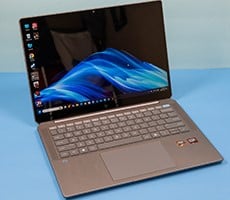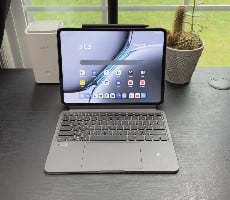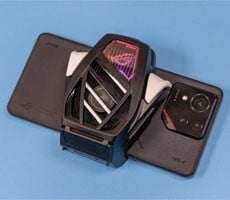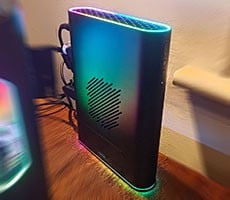HP OmniBook Ultra 14 Review: The Best Of Ryzen AI In A Sleek 14” Laptop
Living with the OmniBook Ultra 14 is a breeze. This machine has handled all the productivity tasks we've thrown at it without issue. Switching between apps is also quick, and the OmniBook even wakes from sleep quickly. Our test unit has 32GB of RAM, which allows it to run plenty of background processes and browser tabs—we have not needed to restrain our usage at all.
The Ryzen AI 9 HX 375 CPU in this machine is almost identical to the HX 370 in the 2024 Asus Zenbook S16 we reviewed recently. We can't say too much about how the high clocked NPU performs in real world workloads just yet because AMD is still has some work to do on the software side of things, though we do have some Procyon AI benchmark numbers on the way. Aside from some minor enhancements, Microsoft's Copilot+ AI-enabled features will arrive in the coming months. Honestly even HP's bundled AI Companion app is light on features, but hey, it's a start.
AMD Strix Point chips have a wide TDP range, but it defaults to 28W on the HP OmniBook Ultra 14. That's higher than the 17W default for the Zenbooks, and HP's performance mode cranks it up to 38W. The benchmarks below were all run in the default 28W state, which is the out of the box experience.
In addition, AMD's integrated Radeon iGPs are surprisingly capable. The Qualcomm-based AI PCs may have a powerful GPU in Adreno, but they aren't as capable for light Windows gaming. The Ryzen AI 9 HX 375 is x86-based, obviously, making it more capable for casual gaming. We've tested with with games like Baldur's Gate 3 and Diablo 4, both of which run reasonably well on medium or low settings with the aid of FSR upscaling. The machine is better suited to casual games like Vampire Survivors, though more on this in our benchmarks ahead.
ATTO Disk Benchmarks With The OmniBook Ultra 14
Now, let's get to those benchmarks. We'll start off with ATTO, a quick and dirty test that measures read/write bandwidth and IOPS across a range of different data transfer sizes. While we don't typically compare these results across multiple machines, it's useful to gauge whether a particular notebook's storage subsystem is up to snuff.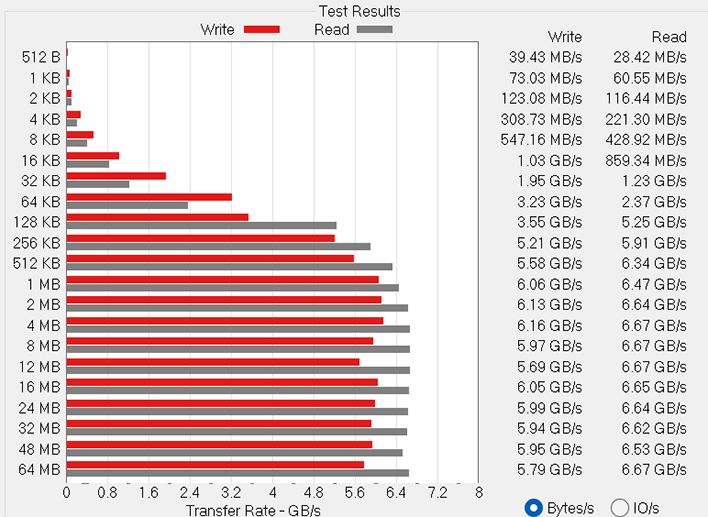
HP used an SK Hynix PCIe Gen4 SSD in this machine, and it chose well because its performance is strong. With a maximum write of 5.79GB/s and reads of 6.67GB/s, this is one of the fastr AI PCs storage subsystems we've tested recently.
Speedometer 3.0 Browser Benchmark
We use BrowserBench.org's Speedometer test to take a holistic look at web application performance. This test automatically loads and runs a variety of sample web apps using the most popular web development frameworks around, including React, Angular, Ember.js, and even simple JavaScript. This test is an example of how systems cope with real-world, modern web apps. All tests were performed using the latest version of Chrome.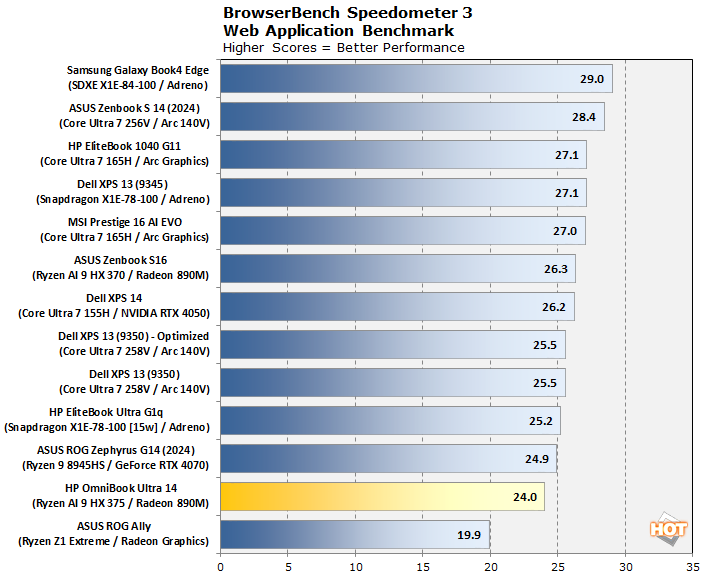
There's not usually much difference among modern PCs in this test. While the OmniBook Ultra 14 trails other recently tested machines, it's just a few points away from the lead. You shouldn't notice any issues with how this hardware handles even the heaviest websites with good responsiveness form the machine.
MAXON Cinebench 2024 3D Rendering Benchmark Results
Next up is the latest-generation 3D rendering benchmark from Maxon, based on the Cinema 4D rendering engine. It's a purely CPU-based test that doesn't make use of the graphics processor or NPU, and it scales very well with additional CPU cores. We ran both single- and multi-threaded tests on all of the machines in the charts.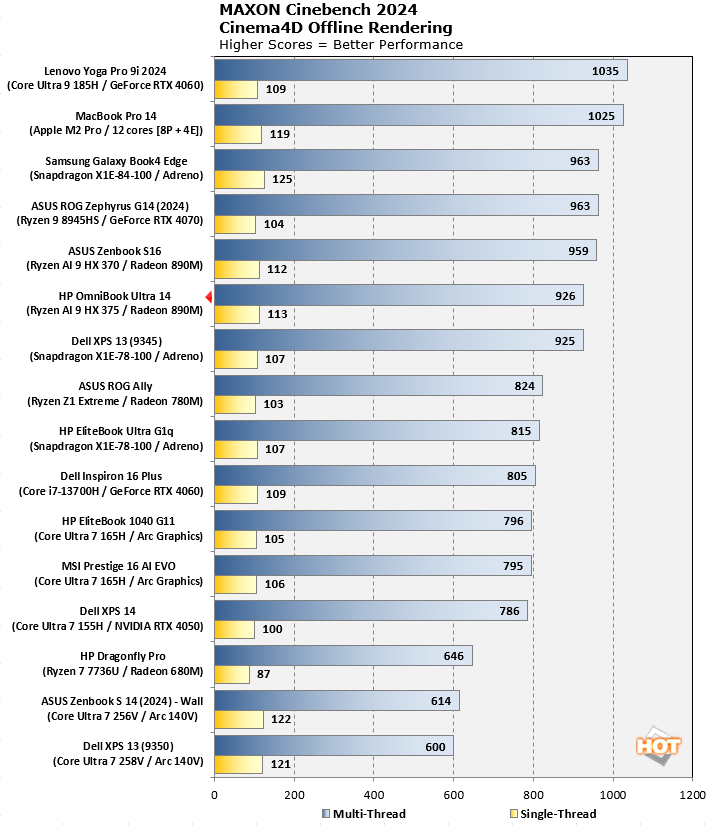
You can really see the advantage of Ryzen AI 300 for multicore workloads in this test. While the Intel Lunar Lake chips like the 258V have great single-core performance, they fall well behind AMD's chips in the multi-core test. The OmniBook with its HX 375 is competitive with Qualcomm's Snapdragon X Elite and powerful higher-wattage CPUs like the Ryzen 9 8945HS.
Geekbench 6 CPU Performance Benchmark
Geekbench is a cross-platform benchmark that simulates real-world workloads in a wide variety of tasks, including encryption, image processing, physical simulation, machine learning, and many more. We tested the systems featured here with the latest Geekbench 6 version to get an idea of their overall system performance.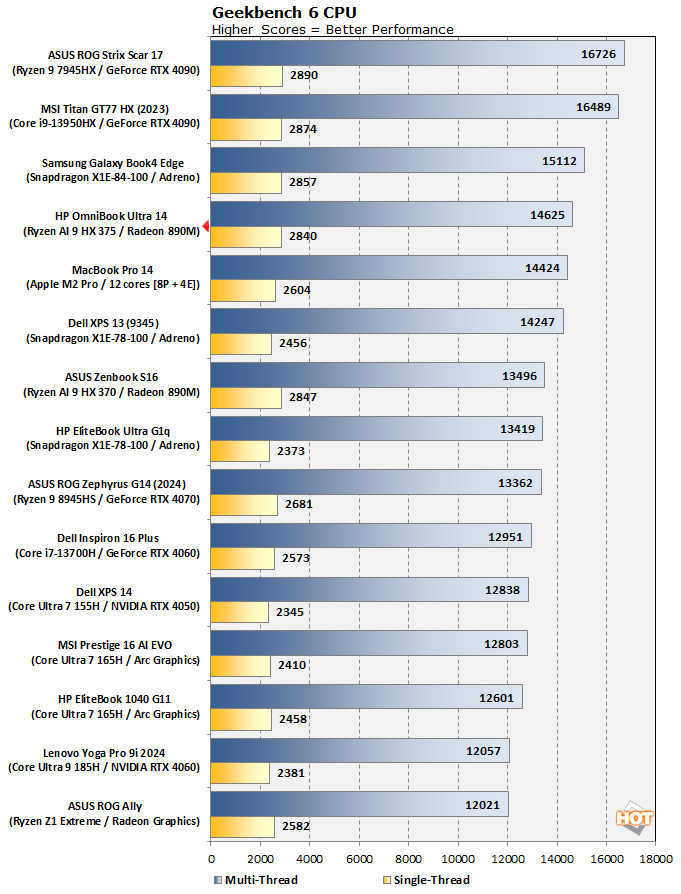
The OmniBook Ultra 14 puts up one of the best scores we've seen in Geekbench, surpassing several Snapdragon machines and Apple's M2 chip in the MacBook Pro. The only chips to consistently beat it have much higher TDP. Geekbench is a synthetic test, so it doesn't offer any insights into real-world performance. We do have some tests for that, though.
UL PCMark 10 Applications Benchmark
The PCMark 10 Applications benchmark measures performance in the Microsoft Office suite, as well as in the Edge browser, offering native instruction set-compatible versions of the apps for optimal performance across a wide variety of workloads in tools office workers, students and home users utilize every day. The following results should show a view of performance with a best foot forward from all systems tested.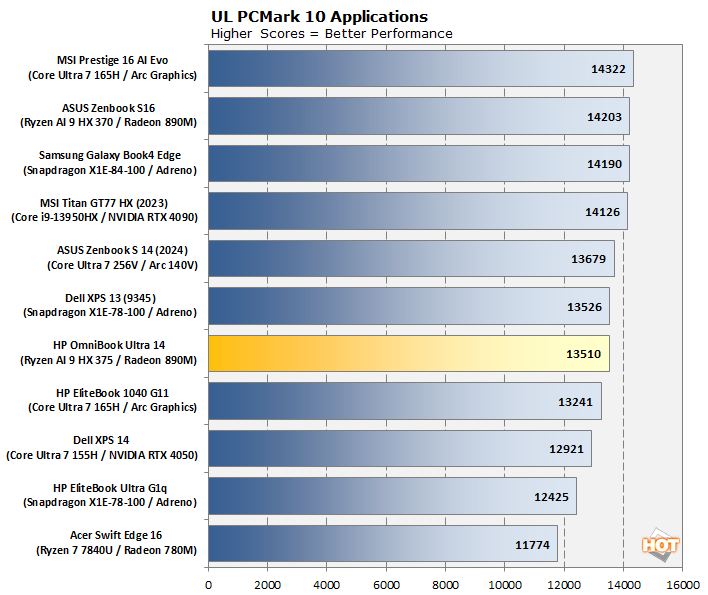
This test favors memory bandwidth and fast storage, and the OmniBook has both. The OmniBook puts up a solid number here, running in the middle of the pack with Lunar Lake and AI 300 machines. However, the Zenbook 16 S with its similar Ryzen AI HX 370 chip is a few hundred points ahead, though it's a larger machine with a bit more thermal headroom. We then reran this test with the higher performance mode enabled, and the OmniBook increased its score by almost 200 points.
UL Procyon AI Benchmark
The Procyon Ai Vision benchmark tests how well a machine can run AI workloads, but it can't run at its full potential on the OmniBook, unfortunately. That's not HP's fault, though. AMD launched the HX 375 without support for Windows ML (or AMD's own 3rd party framework like Intel's OpenVino), so Procyon cannot access the chip's allegedly powerful NPU. The same may hold true for any other application that should want to use the NPU for AI processing on Windows, though we've heard of some recent progress with some 3rd party productivity and creation apps.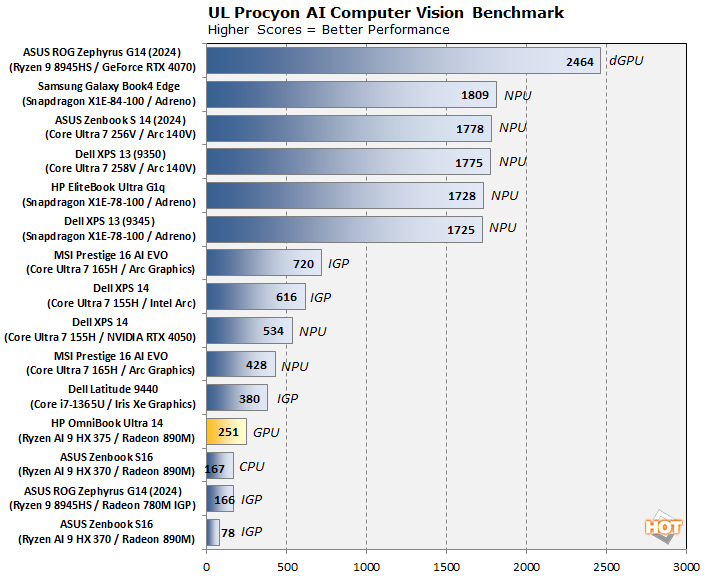
UL 3DMark Gaming Benchmarks
3DMark has a wide variety of graphics and gaming related tests available. In this next test, we chose to run 3DMark Night Raid, a modern DirectX 12 test specifically for mobile platforms with integrated graphics, as well as the more-demanding, cross-platform Wild Life Extreme benchmark which utilizes more modern rendering APIs.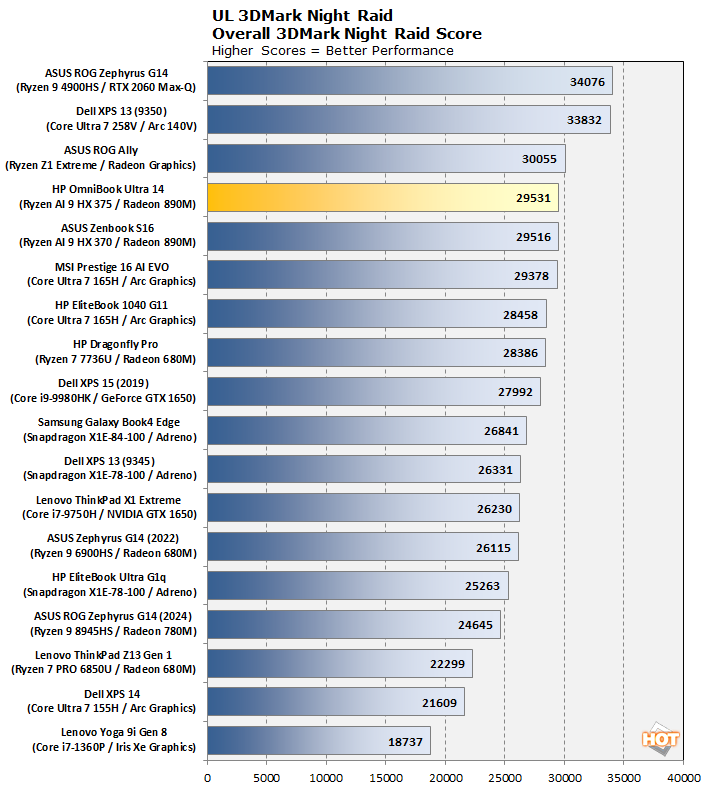
The HP OmniBook Ultra 14 is not a gaming machine, but AMD's Radeon iGPUs have long provided enough oomph for casual gaming. However, Intel's new Arc graphics in Lunar Lake has jumped out in front. The Radeon 890m can't catch Arc 140V, but it's still among the best you'll get for integrated graphics.
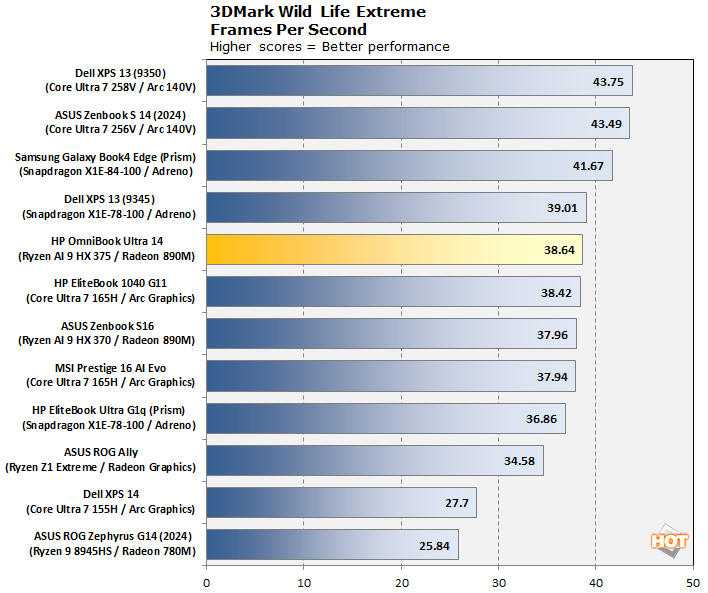
The lineup is very similar for the less taxing Wild Life test, which shows the OmniBook near the top but trailing the Lunar Lake-powered Zenbook and Dell XPS by a hair. While we see laptops like the Samsung Galaxy Book4 Edge running neck and neck with the OmniBook, it's worth remembering that Windows games don't play as nicely with Arm (though that will be changing with Microsoft's recent support for AVX instructions for Windows on Arm). So, the x86 chip will be better in practice even if it doesn't benchmark as high.
F1 22 Formula 1 Racing Game Benchmark
Racing simulator F1 2022 is a DirectX 12 game title that is surprisingly sensitive to certain system configurations, so it's a useful test to explore the intricacies of a laptop's performance characteristics. We tested the game in its High graphics preset, with upscaling disabled, and at 1080p resolution.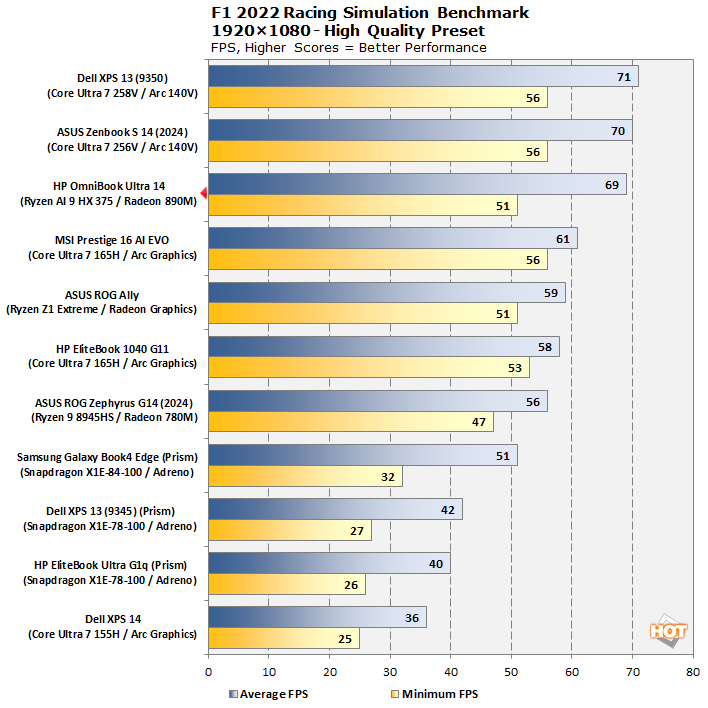
The HP OmniBook Ultra 14 pulled down one of the best scores we've seen in this benchmark, running almost even with the Lunar Lake-based Asus Zenbook and Dell XPS 13 machines. While the HP laptop's minimum frame rate was a bit lower than those computers, its average is excellent. As expected, the Snapdragon X Elite can't keep up in real games when compared to x86 chips.
Gears Tactics Strategy Game Benchmark
Gears Tactics, released in 2020, still makes an excellent benchmark for integrated graphics. It's a tightly-optimized Unreal Engine title with a highly-configurable built-in benchmark that provides a wealth of performance data after each run. We tested it on High, Medium, and Low presets at 1920×1080 resolution.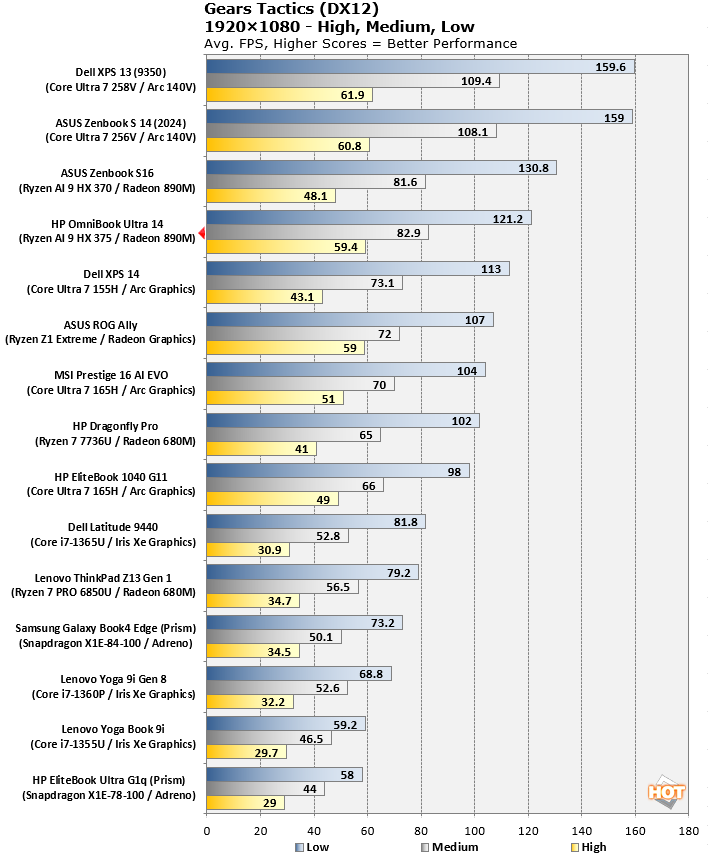
Gears tells the same story as above. The OmniBook Ultra 14 is near the top of the heap, trading blows with Lunar Lake machines with Arc 140V graphics. The HP machine performed particularly well on the high setting, running almost dead even with Lunar Lake.


